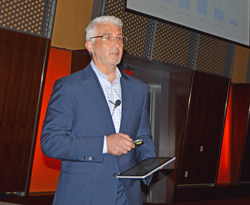MRLs Affecting International Market Movement
In addition to tariffs, chemical residues are increasingly becoming an issue in markets around the world and at times are restricting international blueberry trade, according to Bill Bryant, chairman of Bryant Christie, an international trade-policy and marketing firm that helps the blueberry industry open new markets.
 |
Bill Bryant, chairman of the Seattle firm Bryant Christie, address participants at the 2020 Oregon Blueberry Conference. |
“For years it wasn’t much of an issue, because most of the planet referred to a common set of international standards,” Bryant said in a presentation on maximum residue levels, or MRLs, at the Oregon Blueberry Conference in February. “But in the last few years, everyone has decided to set their own standards.
“So now we have different standards in different countries and we have different products registered in different countries and that is creating problems for exporters around the world,” he said. “And the consequences can be severe.”
In addition to different countries setting different standards, Bryant said individual retailers, such as Costco, also have begun testing products and demanding lists of crop inputs and the corresponding MRLs from their suppliers.
“That is particularly true in Europe,” Bryant said. “A lot of the supermarket chains are doing their own testing and, in some cases, their requirements are even more strict than the government requirements.”
European government officials, meanwhile, are regulating the residues under a regimen designed to eliminate any potential risk of exposure, rather than under practical terms.
“Europe is saying if there is any possible hazard at all, we aren’t going to set an MRL,” Bryant said. “If you did that for salt, you would take salt off the market, because if you eat enough salt, you could get stomach cancer.
“But, of course, no one is going to eat that much salt,” he said.
“We have a big battle coming up with the European Union,” Bryant added, “because they are moving to remove dozens and dozens of products that U.S. agriculture uses every day.”
When no MRLs are listed, allowable residue levels fall back to zero tolerance.
China, too, is coming up with its own standards, Bryant said. “They are saying that if they don’t have a standard, you aren’t going to be able to export there. That would bring U.S. ag exports to China to a halt, because they don’t have many standards.”
“We are watching China really carefully,” he said.
Taiwan also is preparing to release its own standards, Bryant said, and Korea released a list of 3,000 new MRLs in October of 2017 without a single MRL for blueberries.
The release triggered immediate action on the part of Bryant Christie, Bryant said. “We swung into action, particularly (Bryant Christie executive) Matt Lantz, and by October of 2018, we had 93 percent of the MRLs we needed covered in Korea and we have temporary MRLs for the others,” Bryant said. “We will try to finalize those before the Korean MRLs go into effect in 2021.”
Bryant ended his presentation by noting that chemical residues are among a suite of issues affecting U.S. ag exports that include tariffs and quarantines.
“Those are all areas we need to look at if we want to strengthen our exports,” he said.